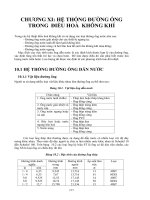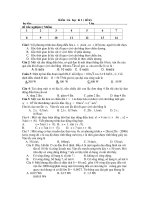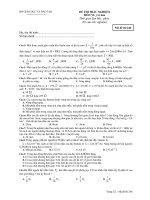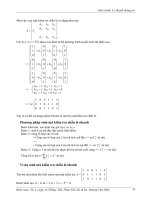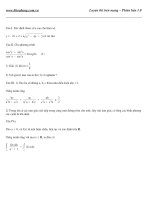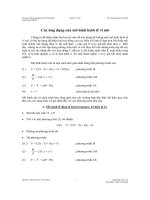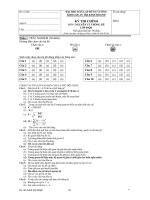PASSAGE 8
Bạn đang xem bản rút gọn của tài liệu. Xem và tải ngay bản đầy đủ của tài liệu tại đây (45.57 KB, 4 trang )
PASSAGE 8
REALITY TELEVISION
Reality television is a genre of television programming which, it is claimed presents unscripted
dramatic or humorous situations, documents actual events, and features ordinary people rather than
professional actors. It could be described as a form of artificial or "heightened" documentary. Although
the genre has existed in some form or another since the early years of television, the current explosion of
popularity dates from around 2000.
Reality television covers a wide range of television programming formats, from game or quiz shows
which resemble the frantic, often demeaning programmes produced in Japan in the 1980s and 1990s (a
modern example is Gaki no tsukai), to surveillance- or voyeurism focused productions such as Big
Brother.
Critics say that the term "reality television" is somewhat of a misnomer and that such shows
frequently portray a modified and highly influenced form of reality, with participants put in exotic
locations or abnormal situations, sometimes coached to act in certain ways by off-screen handlers. and
with events on screen manipulated through editing and other post-production techniques.
Part of reality television's appeal is due to its ability to place ordinary people in extraordinary
situations. For example, on the ABC show, The Bachelor, an eligible male dates a dozen women
simultaneously, travelling on extraordinary dates to scenic locales.Reality television also has the potential
to turn its participants into national celebrities outwardly in talent and performance programs such as Pop
Idol, though frequently Survivor and Big Brother participants also reach some degree of celebrity.
Some commentators have said that the name "reality television" is an inaccurate description for
several styles of program included in the genre. In competition-based programs such as Big Brother and
Survivor, and other special-living-environment shows like The Real World, the producers design the
format of the show and control the day-to-day activities and the environment, creating a completely
fabricated world in which the competition plays out. Producers specifically select the participants, and use
carefully designed scenarios, challenges, events, and settings to encourage particular behaviours and
conflicts. Mark Burnett, creator of Survivor and other reality shows, has agreed with this assessment, and
avoids the word “reality" to describe his shows; he has said, "It tells good stories. It really is not reality
TV. It really is unscripted drama."
Question 1. In the first line, the writer says ‘it is claimed’ because _______.
A. they agree with the statement
B. everyone agrees with the statement
C. no one agrees with the statement
D. they want to distance themselves from the statement
Question 2. Reality television has _______.
A. always been this popular
B. been popular since well before 2000
C. only been popular since 2000
D. been popular since approximately 2000
Question 3. Japan _______.
A. is the only place to produce demeaning TV shows
B. has produced demeaning TV shows copied elsewhere
C. produced Big Brother
Page 1
D. invented surveillance focused productions
Question 4. People have criticised reality television because _______.
A. it is demeaning
B. it uses exotic locations C. the name is inaccurate D. it shows reality
Question 5. Reality TV appeals to some because _______.
A. it shows eligible males dating women
B. it uses exotic locations
C. it shows average people in exceptional circumstances
D. it can turn ordinary people into celebrities
Question 6. Pop Idol _______.
A. turns all its participants into celebrities
B. is more likely to turn its participants into celebrities than Big Brother
C. is less likely to turn its participants into celebrities than Big Brother
D. is a dating show
Question 7. The term ‘reality television’ is inaccurate _______.
A. for both talent- performance and special living environment programs
B. just for Big Brother and Survivor
C. for talent and performance programs
D. for special-living-environment programs
Question 8. Producers choose the participants _______.
A. on the ground of talent
B. only for special-living-envoronment shows
C. to create conflicts
D. to make a fabricated world
Question 9. Mart Burnett _______.
A. was a participant on Survivor
B. is a critic of reality TV
C. thinks the term ‘reality television’ is inaccurate
D. writes the script for Survivor
Question 10. Shows like Survivor _______.
A. are definitely reality TV
B. are scripted
C. have good narratives
D. are theatre
ĐÁP ÁN
1-D
2-D
3-B
4-C
5-C
6-C
7-A
8-C
9-C
10-C
LỜI GIẢI CHI TIẾT
Question 1:
Tác giả viết it is claimed là để giúp câu này mang tính objective và less subjective -> để họ khơng có vẻ là
người đã nói ra câu statement này
Question 2:
Page 2
Thông tin trong câu . Although the genre has existed in some form or another since the early years of
television, the current explosion of popularity dates from around 2000.
Question 3:
Thông tin trong câu: Reality television covers a wide range of television programming formats, from
game or quiz shows which resemble the frantic, often demeaning programmes produced in Japan in the
1980s and 1990s (a modern example is Gaki no tsukai)
Question 4:
Thông tin trong câu: Some commentators have said that the name "reality television" is an inaccurate
description for several styles of program included in the genre.
Question 5:
Thông tin trong câu: Part of reality television's appeal is due to its ability to place ordinary people in
extraordinary situations
Question 6:
Thông tin trong câu: Reality television also has the potential to turn its participants into national
celebrities outwardly in talent and performance programs such as Pop Idol, though frequently Survivor
and Big Brother participants also reach some degree of celebrity.
Question 7:
Thông tin trong đoạn Some commentators have said that the name "reality television" is an inaccurate
description for several styles of program included in the genre. In competition-based programs such as
Big Brother and Survivor, and other special-living-environment shows like The Real World, the producers
design the format of the show and control the day-to-day activities and the environment, creating a
completely fabricated world in which the competition plays out.
Question 8:
Thông tin trong câu: Producers specifically select the participants, and use carefully designed scenarios,
challenges, events, and settings to encourage particular behaviours and conflicts
Question 9:
Thông tin trong câu: Mark Burnett, creator of Survivor and other reality shows, has agreed with this
assessment, and avoids the word “reality" to describe his shows; he has said, "I tell good stories. It really
is not reality TV. It really is unscripted drama."
Question 10:
Thông tin trong câu: , "It tells good stories.”
BÀI DỊCH
Truyền hình thực tế là một thể loại chương trình truyền hình được tun bố rằng ln đưa ra các tình
huống kịch tính hoặc hài hước khơng theo kịch bản có sẵn, ghi lại các sự kiện thực tế, và các hoạt động
của người dân bình thường chứ khơng phải diễn viên chun nghiệp. Nó có thể được mơ tả như một hình
thức phim tài liệu nhân tạo hoặc "nâng cao" . Mặc dù thể loại này đã tồn tại dưới một số hình thức khác
nhau từ những năm đầu tiên của truyền hình, sự phổ biến hiện nay của nó bắt đầu từ khoảng năm 2000.
Truyền hình thực tế bao gồm một loạt các dạng chương trình truyền hình, từ trị chơi và các chương
trình câu đố- những chươn trình giống với các chương trình rẻ tiền từng được sản xuất rầm rộ tại Nhật
Page 3
Bản trong năm 1980 và 1990 (một ví dụ hiện tại là Gaki Tsukai), đến chương trình theo dõi- hay các sản
phẩm tập trung vào trí tị mị của Big Brother.
Những người chỉ trích nói rằng "truyền hình thực tế" phần nào là một cái thuật ngữ sai và các chương
trình như vậy thường xuyên dựng lên một thực tế đã bị sửa đổi và ảnh hưởng, với những người tham gia
put tại các địa điểm kỳ lạ hoặc trong các tình huống bất thường, đơi khi được huấn luyện để hành động
theo những cách nhất định bằng những người xử lý sau màn ảnh, và với các sự kiện trên màn hình được
thao tác thơng qua sự biên tập và xử lý kỹ thuật sau sản xuất khác.
Một phần của truyền hình thực tế hấp dẫn là do khả năng của nó trong việc đặt những người bình
thường trong các tình huống bất thường. Ví dụ, trong chương trình ABC, Người độc thân, một người đàn
ông đủ điều kiện hẹn hò cả chục phụ nữ cùng một lúc, đi du lịch trong những buổi hẹn hò đến các địa
phương danh lam thắng cảnh. Truyền hình thực tế cũng có khả năng để biến người tham gia chương trình
thành nhân vật nổi tiếng quốc gia trong những chương trình tài năng và trình diễn như Pop Idol, mặc dù
thường thì người tham gia Survivor và Big Brother cũng đạt được một mức độ nổi tiếng tương đối.
Một số nhà bình luận đã cho rằng cái tên "truyền hình thực tế" mơ tả khơng chính xác cho nhiều
phong cách của chương trình bao gồm trong thể loại này. Trong các chương trình dựa trên thi thố cạnh
tranh như Big Brother và Survival, và những chương trình về mơi trường sống đặc biệt như The Real
World, nhà sản xuất thiết kế các định dạng của chương trình và kiểm sốt các hoạt động và môi trường
sản xuất mỗi ngày, tạo ra một thế giới hoàn toàn được bịa đặt ra mà ở đó các cuộc thi hoặc sự cạnh tranh
diễn ra. Các nhà sản xuất tự tay chọn những người tham gia, và sử dụng kịch bản, thách thức, các sự kiện,
và các thiết lập đã được thiết kế cẩn thận để khuyến khích thúc đẩy những hành vi và xung đột cụ thể.
Mark Burnett, tác giả của chương trình Survivor và các chương trình thực tế khác, đã đồng ý với đánh giá
này, và ông cũng tránh từ "thực tế" để mơ tả chương trình của mình; ơng đã nói: "Tơi làm về những câu
chuyện hay. Nó thực sự khơng phải là truyền hình thực tế. Thật ra nó là phim khơng có kịch bản trước mà
thơi."
Page 4


